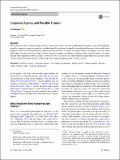Files in this item
Corporate agency and possible futures
Item metadata
| dc.contributor.author | Mulgan, Tim | |
| dc.date.accessioned | 2018-05-04T15:30:10Z | |
| dc.date.available | 2018-05-04T15:30:10Z | |
| dc.date.issued | 2018-05-03 | |
| dc.identifier | 252933797 | |
| dc.identifier | 8aa20d25-7b50-454d-8812-0a9af879367a | |
| dc.identifier | 85046495277 | |
| dc.identifier | 000458212600002 | |
| dc.identifier.citation | Mulgan , T 2018 , ' Corporate agency and possible futures ' , Journal of Business Ethics , vol. First Online . https://doi.org/10.1007/s10551-018-3887-1 | en |
| dc.identifier.issn | 0167-4544 | |
| dc.identifier.uri | https://hdl.handle.net/10023/13302 | |
| dc.description.abstract | We need an account of corporate agency that is temporally robust – one that will help future people to cope with challenges posed by corporate groups in a range of credible futures. In particular, we need to bequeath moral resources that enable future people to avoid futures dominated by corporate groups that have no regard for human beings. This paper asks how future philosophers living in broken or digital futures might re-imagine contemporary debates about corporate agency. It argues that the only temporally robust account is moralised extreme collectivism, where full moral personhood is accorded (only) to those corporate groups that are reliably disposed to respond appropriately to moral reasons. | |
| dc.format.extent | 16 | |
| dc.format.extent | 927580 | |
| dc.language.iso | eng | |
| dc.relation.ispartof | Journal of Business Ethics | en |
| dc.rights | © The Author(s) 2018. Open Access. This article is distributed under the terms of the Creative Commons Attribution 4.0 International License (http://creativecommons.org/licenses/by/4.0/), which permits unrestricted use, distribution, and reproduction in any medium, provided you give appropriate credit to the original author(s) and the source, provide a link to the Creative Commons license, and indicate if changes were made. | en |
| dc.subject | Collective agency | en |
| dc.subject | Corporate agency | en |
| dc.subject | Corporate responsibility | en |
| dc.subject | Future people | en |
| dc.subject | Climate change | en |
| dc.subject | Broken world | en |
| dc.subject | Virtual reality | en |
| dc.subject | Artificial intelligence | en |
| dc.subject | B Philosophy (General) | en |
| dc.subject | HD Industries. Land use. Labor | en |
| dc.subject | T Technology (General) | en |
| dc.subject | T-NDAS | en |
| dc.subject | SDG 13 - Climate Action | en |
| dc.subject | SDG 15 - Life on Land | en |
| dc.subject.lcc | B1 | en |
| dc.subject.lcc | HD | en |
| dc.subject.lcc | T1 | en |
| dc.title | Corporate agency and possible futures | en |
| dc.type | Journal article | en |
| dc.contributor.institution | University of St Andrews.Philosophy | en |
| dc.contributor.institution | University of St Andrews.St Andrews Centre for Exoplanet Science | en |
| dc.identifier.doi | 10.1007/s10551-018-3887-1 | |
| dc.description.status | Peer reviewed | en |
This item appears in the following Collection(s)
Items in the St Andrews Research Repository are protected by copyright, with all rights reserved, unless otherwise indicated.

